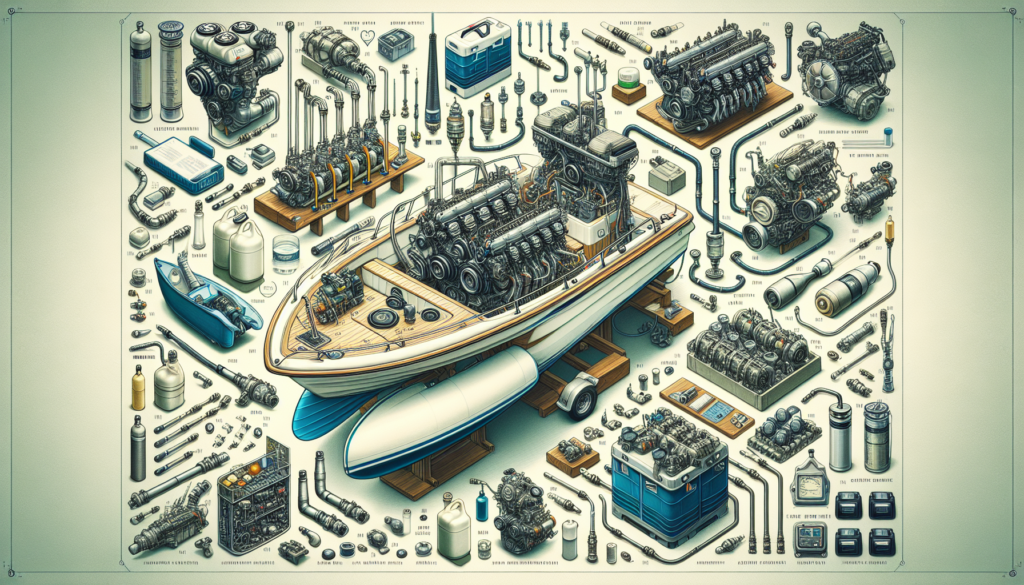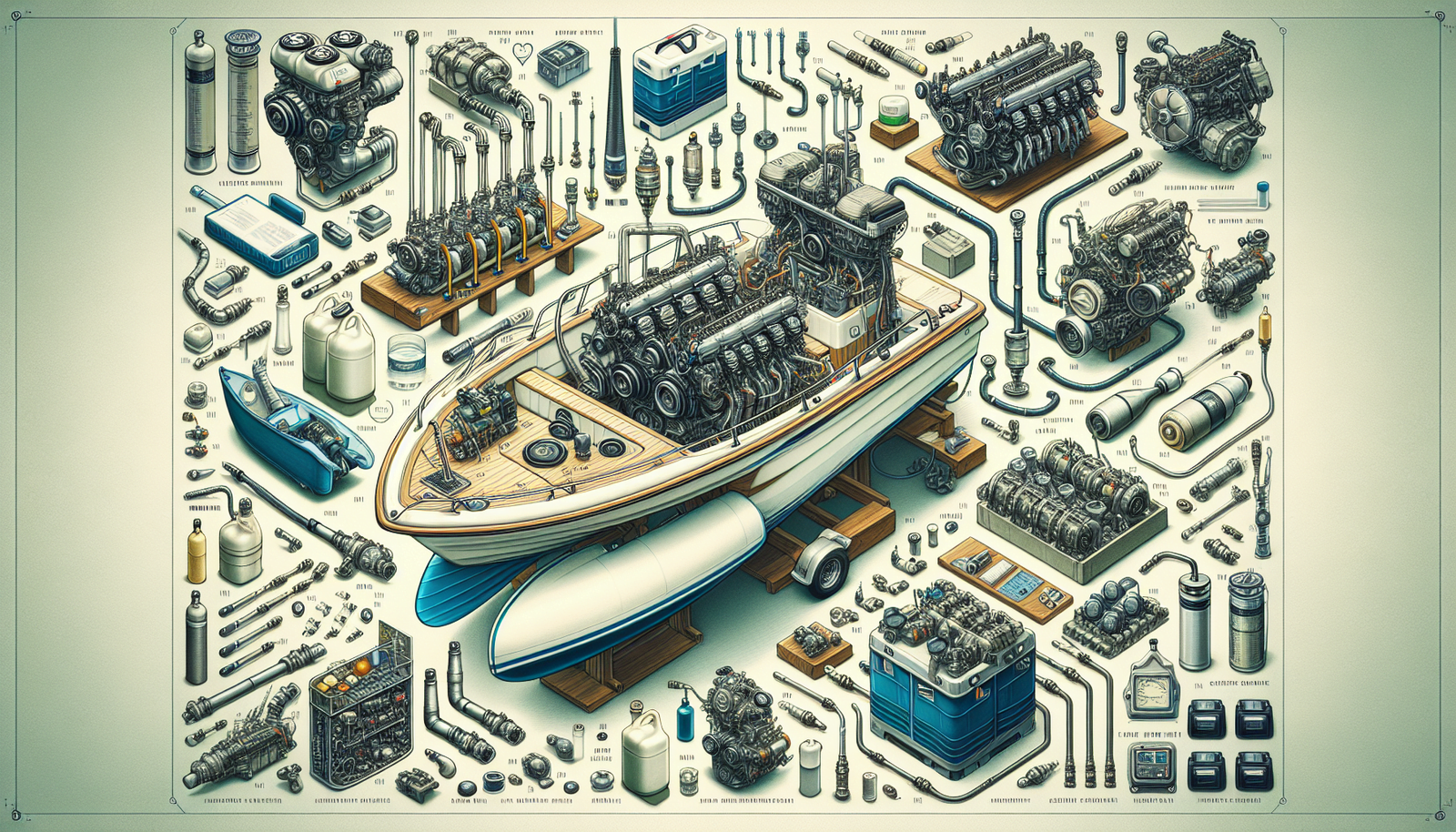Sailing on the open sea is a matchless experience, yet what fuels this adventurous hobby remains an elusive mystery for many. In this article, ‘Most Efficient boat engine fuel systems Explained,’ we’ll guide you through the complex intricacies of various boat engine fuels, from the basics of system specifications to the more advanced understanding of how energy efficiency impacts your boat’s performance. Rest assured, after reading this, you’ll not just appreciate the wind in your sails but also the engine beneath your feet. Be ready to navigate the world of boat fuel systems like never before!
Overview of Boat Engine Fuel Systems
Among the key components of any boat is its engine fuel system. It’s the heart that keeps your engine running, propelling you across the water. Understanding more about the intricacies of fuel systems can not only help you keep your boat running smoothly but can also contribute to a more efficient and eco-friendly operation.
Understanding the basic principles
At the fundamental level, a boat engine fuel system is designed to provide a steady flow of fuel from the storage tank to the engine. It does this through a process that involves a series of complex steps. First, the fuel pump draws fuel from the tank and sends it to the engine under pressure. Next, the fuel filter cleans the fuel by removing any debris or other contaminants. Finally, the carburetor or fuel injectors carefully measure and spray the fuel into the engine’s combustion chamber, where it is mixed with air and ignited to produce power.
Components of a boat engine fuel system
There are several key components of a boat engine fuel system, including the fuel tank, fuel pump, fuel lines, fuel filter, and carburetor or fuel injectors. Each plays a vital role in ensuring that fuel is delivered to the engine efficiently and cleanly. It’s also worth noting that different types of boat fuel systems (diesel, gasoline, outboard, electric, and hybrid) will have specific components suited to their type and function.
Importance of an efficient fuel system
Having an efficient fuel system is paramount for any type of boat. It not only ensures a smooth ride across the water but also maximizes fuel economy and minimizes environmental impact. Plus, an efficient fuel system extends the lifespan of your engine and reduces the need for costly repairs and replacements.
Diesel Fuel Systems
When it comes to power and endurance, diesel fuel systems are often the preferred choice for many boat owners.
Components and working of a diesel fuel system
A typical diesel fuel system includes components such as a fuel tank, fuel pump, fuel filter, and injectors. The fuel pump delivers high-pressure fuel to the injectors, which then spray it into the combustion chamber. Diesel engines use a system of direct fuel injection—where fuel is directly injected into the combustion chamber—resulting in a more efficient combustion process.
Advantages of diesel fuel systems
One of the major advantages of diesel fuel systems is their fuel efficiency. Diesel engines typically consume less fuel and deliver more power compared to their gasoline counterparts. They’re also known for their durability and relative ease of maintenance.
Challenges and solutions in diesel fuel systems
On the flip side, diesel fuel systems can have some challenges. These include higher upfront costs, louder operation, and more substantial exhaust emissions. However, advancements in diesel technology have led to quieter, cleaner engines with improved emission control.
Ways to improve efficiency in diesel fuel systems
There are several ways to improve the efficiency of diesel fuel systems. These include regular maintenance, using high-quality fuel, and ensuring the fuel injection system is clean and in good working order.

Gasoline Fuel Systems
While diesel engines may be known for their endurance and power, gasoline fuel systems have their advantages too.
Understanding Gasoline engine systems
In a gasoline engine fuel system, fuel is pumped from the tank, filtered, and then delivered to the engine’s carburetor or fuel injectors where it is mixed with air and ignited by a spark from the spark plugs. This combustion process drives the engine and propels the boat.
Pros and cons of gasoline fuel systems
Gasoline engines tend to be lighter and quieter than diesel engines. They’re also less expensive initially and have a smooth, fast response. However, they may require more frequent maintenance and aren’t as fuel-efficient as diesel engines.
Enhancing efficiency in gasoline fuel systems
Maintaining clean fuel injectors and ensuring a good spark from your spark plugs can enhance efficiency in a gasoline fuel system. Regular service and oil change also contribute to improved fuel efficiency.
Outboard Fuel Systems
Outboard fuel systems are a common choice for smaller boats thanks to their high power-to-weight ratio and ease of installation.
Basic components of outboard fuel systems
The basic components of an outboard fuel system are much like those of inboard systems—fuel tank, fuel pump, fuel lines, fuel filter, and carburetor or fuel injectors. However, all these are contained within the outboard motor itself, and the entire unit mounts to the stern of the boat.
How outboard fuel systems work
In an outboard fuel system, fuel is drawn from the tank, filtered, and then delivered to the engine. Depending on the model, the fuel is then mixed with air in a carburetor or injected directly into the combustion chamber. The resulting combustion powers the engine and propels the boat forward.
Improving efficiency in outboard fuel systems
Regular maintenance is crucial to improve efficiency in outboard fuel systems. Cleaning and adjusting your carburetor or fuel injectors and replacing your fuel filter regularly can prevent poor fuel-air mixtures and consequent engine problems.

Electric Fuel Systems
With growing concerns about the environment, electric boat fuel systems have become increasingly popular.
Working principle of electric boat fuel systems
Electric boat fuel systems use a battery or a generator as the main power source. This energy is supplied to an electric motor that drives the boat. A key advantage of electric boat fuel systems is their simplicity, with fewer moving parts than internal combustion engines.
Benefits and limitations of electric fuel systems
Electric boat engines produce zero emissions at the tailpipe, making them a much greener alternative to gasoline and diesel fuel systems. They’re quiet, efficient and cheaper to maintain and operate. However, their major limitation is the short range they provide due to battery capacity.
Maximizing efficiency in electric fuel systems
Maximizing efficiency in electric fuel systems involves keeping your battery in good health, which entails regular charging and discharging, keeping it clean, and protecting it from overcharging, extreme temperatures, and physical damage.
Hybrid Fuel Systems
Hybrid boat fuel systems combine the best of both worlds—the power of an internal combustion engine and the efficiency of an electric motor.
Concept of hybrid boat fuel systems
A hybrid boat fuel system employs both an internal combustion engine and an electric motor. Depending on the design, the boat may use either of the power sources at a time or both together to optimize efficiency.
Components and working of hybrid fuel systems
In addition to having a fuel tank, fuel pump, fuel filter, and carburetor or injectors much like a traditional fuel system, a hybrid system also includes a battery (or generator) and an electric motor. The battery stores power generated by the engine during cruising or from the shore when plugged in.
Understanding the energy efficiency in hybrid fuel system
Hybrid systems are designed to tap into the power of the internal combustion engine when it’s most efficient (like higher speed ranges) and to use the electric drive when the engine isn’t efficient (such as low-speed maneuvering). Therefore, hybrid fuel systems often offer significant fuel savings and reduced emissions.
Sustainable alternatives for Boat Fuel Systems
In a world grappling with climate change, sustainable alternatives for boat fuel systems are increasingly gaining importance.
Types of alternative boat fuel systems
There are several types of alternative boat fuel systems including solar-powered, wind-powered, and even hydrogen fuel cells. These systems either produce their energy (like solar panels and wind turbines) or store electrical energy produced elsewhere (like batteries and fuel cells).
Impact of sustainable fuel systems on efficiency
Sustainable fuel systems are not just a greener alternative; they can also be incredibly efficient. Solar power, for example, can provide all of a boat’s energy needs in favorable conditions, significantly reducing fuel consumption and the associated costs.
Challenges and future prospects of alternative fuel systems
Currently, the main challenges facing alternative fuel systems include their relatively high cost, dependence on weather conditions (in the case of wind and solar power), and the need for substantial battery storage. However, with continuous advancements in technology and a growing focus on sustainability, the future of alternative fuel systems looks promising.
Maintenance and Efficiency
maintaining your boat engine fuel system is critical to its efficiency and longevity.
Importance of regular maintenance for fuel efficiency
The efficiency of your fuel system is largely dependent on its maintenance. Regular maintenance keeps the fuel system clean and in good working order, preventing problems that can lead to poor fuel economy. It can also lead to a more pleasant boating experience, with smoother rides and fewer unexpected breakdowns.
Maintenance tips for different fuel systems
Despite the differences across various types of fuel systems, some maintenance tips apply to all. Regularly inspect your fuel lines, clean the fuel filter, and make sure your fuel injectors or carburetor are clean. On electric and hybrid systems, keeping your battery or generator in good condition is critical.
Role of maintenance in extending lifespan of the fuel system
Regular maintenance not only improves the efficiency of your fuel system but also extends its longevity. It helps to prevent wear and tear that can lead to costly repairs or replacements down the line.
Fuel Efficiency and Its Impact on Environment
Given that the marine sector contributes significantly to global greenhouse gas emissions, fuel efficiency and its environmental impact are important considerations.
Understanding the relationship between fuel efficiency and environment
The more efficient a boat’s fuel system, the less fuel it uses to travel a certain distance. This results in lower carbon emissions and a smaller environmental footprint.
How efficient fuel systems reduce carbon footprint
Efficient fuel systems reduce the amount of carbon emissions by burning less fuel for the same output or by utilizing greener fuels (like in the case of electric and hybrid systems). Also, more efficient engines typically emit fewer pollutants like nitrogen oxides and particulates.
Steps to ensure environmentally-friendly boat operations
Using an efficient fuel system is just one step towards making your boat operations more environmentally-friendly. Regular maintenance, responsible boating practices (like reducing speed and avoiding unnecessary idling), and the use of sustainable alternative fuels can all contribute to a greener boating experience.
Future of Boat Engine Fuel Systems
The future of boat engine fuel systems will likely revolve around efficiency and sustainability as environmental concerns continue to intensify.
Emerging trends in boat engine fuel systems
Recent trends in boat engine fuel systems include an increased focus on hybrid and electric systems, the use of cleaner fuels (like biodiesel and ethanol), and advancements in engine design for greater efficiency. There’s also a growing interest in renewable energy sources like wind and solar power.
Innovative technology for improving fuel efficiency
Technology plays a significant role in improving fuel efficiency. Innovations like advanced electric propulsion systems, cutting-edge hydrogen fuel cells, and smart energy management systems are paving the way for the future of boat fuel systems.
Impacts of these advancements on boat engine economics and environment
While technological advancements can require substantial investments up front, they can also lead to considerable savings in fuel costs over time. More importantly, they can significantly reduce the environmental impact of boating, helping to preserve our waterways for future generations to enjoy.


[…] engines are quieter, more fuel-efficient, and provide smoother operation than outboards. They’re also more powerful and suitable for […]